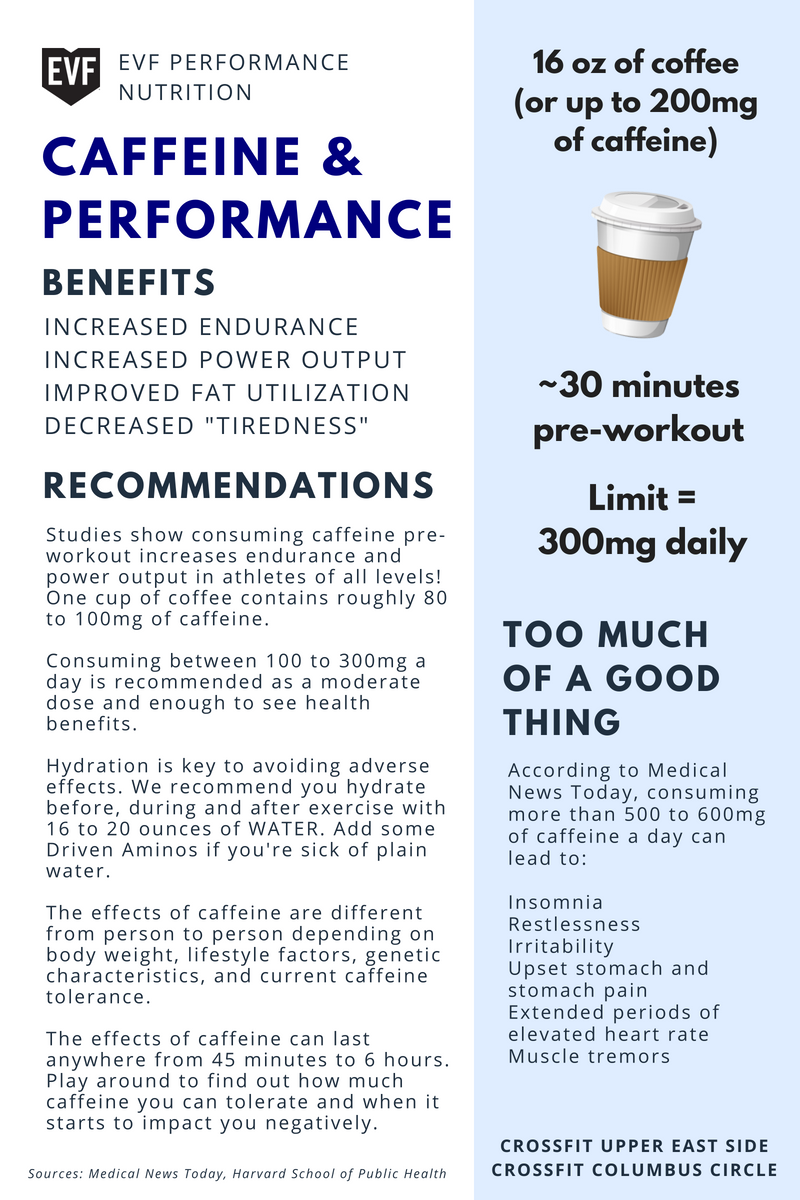Nutrition 101: Caffeine & Performance
Patrick J. Frank, CF-L3, CSCS, USAW
Caffeine is one of the most commonly used substances on the planet. Those who work or train in those early hours swear by their cup of joe, and some can’t function without it. Caffeine is found in a number of products we consume every day — energy drinks, most carbonated beverages (soda), sports gels and bars, pre- and intra-workout drinks, and the obviously one … COFFEE. Caffeine has been shown to improve speed, power output, and endurance in all levels of athletes, but can too much of a good thing be detrimental to our health?
Pros
- Can improve your workout and competition performance
- Regular/moderate use can reduce the risk of developing cardiovascular disease, type-2 diabetes, Parkinson’s disease, and stroke as well as boosting longterm memory
- Can increase fat utilization during and after exercise (i.e. shedding body fat)
Cons
- Too much can leave you restless, irritable, and throw your circadian rhythm out of whack
- Excessive caffeine/coffee consumption can lead to dehydration so be sure to drink lots of water throughout the day
- Limit consumption while pregnant (talk to your doctor)
According to a study published in the Journal of Applied Physiology, researchers found consuming caffeine (specifically 16 ounces of coffee, containing 160 to 200mg of caffeine) before a workout actually increased performance and made it feel more enjoyable than those who consumed a placebo/no caffeine at all.
But how much caffeine leads to adverse effects? According to Medical News Today, more than 500 to 600mg of caffeine a day may lead to insomnia, nervousness, restlessness, irritability, upset stomach, extended periods of elevated heart rate, and even muscle tremors.
Caffeine stimulates your adrenal glands, the little guys responsible for the fight-or-flight and adrenaline responses. Your body then has to work to bring those levels back down. Having too much caffeine in one sitting or adding a workout on top of excess caffeine consumption can have some negative effects over time.
The effects of caffeine can vary from person to person depending on body weight, lifestyle factors, genetic characteristics, and current caffeine tolerance. You won’t know your tolerance level or risk/reward for consumption without a little experimentation.
You nay use coffee or pre/intra-workout drinks to motivate you to get in for class or to help you get through a workout. While either option is generally okay, there are a few things to consider about your caffeine source. It all boils down to one question: What else comes with your caffeine?
Pre- and intra-workout drinks and powders usually come with extras and most of the time that “extra” is a lot of sugar, which adds up over time. I highly encourage you to look at the label of your pre-workout powder before use and see how much sugar and caffeine you’re getting per serving. Make sure it is keeping you within the recommended ranges above and keep sugar/extras intake low when it comes to your workout drink of choice.
One more factor to consider: Do you take your coffee with cream and/or sugar? Having too much cream/sugar can mess with your stomach while working out. It can also add extra carbs and fat to your macros. Keep your coffee black or stay light on the extras. If you do prefer extra cream and sugar, be sure to track them in your macros.
2018 05 14
